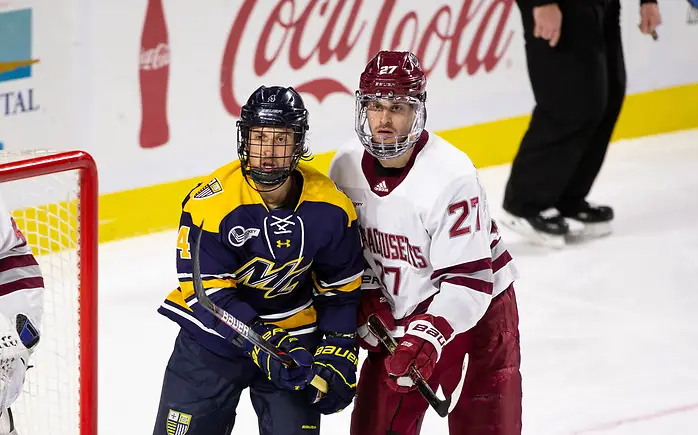
Every now and again, the stat nerd inside of me makes an appearance and my love of number attempts to clarify what, this year at least, is a very crowded playoff picture.
Currently, just three points separates first place from eighth in Hockey East and ties for the top spot and a four-way tie for fourth place makes understand how each team may fall in the playoff picture not just interesting, but also confusing.
Right now, by winning percentage, this is what the Hockey East standings look like:
| Team | Winning Percentage |
|---|---|
| Boston College | 0.667 |
| UMass Lowell | 0.600 |
| Boston University | 0.594 |
| Massachusetts | 0.588 |
| Northeastern | 0.567 |
| Providence | 0.562 |
| Connecticut | 0.529 |
| Maine | 0.529 |
| New Hampshire | 0.469 |
| Merrimack | 0.324 |
| Vermont | 0.067 |
The actual standings look a little bit different because of the number of games in hand certain schools have.
All that said, when I put my stat nerd cap on, I decided to calculate which teams had the toughest go of it for the remainder of the season. I calculated the winning percentage of the remaining opponents and divided by the remaining games.
This was the result:
| Team | Winning Percentage |
|---|---|
| Merrimack | 0.616 |
| Connecticut | 0.574 |
| Vermont | 0.538 |
| UMass Lowell | 0.530 |
| Boston University | 0.515 |
| Massachusetts | 0.492 |
| Northeastern | 0.487 |
| New Hampshire | 0.482 |
| Boston College | 0.471 |
| Maine | 0.411 |
| Providence | 0.377 |
As you can see, it is an unfortunate schedule that remains for two of the league’s bottom three teams – Merrimack and Vermont – as their final games are the most difficult. Add in UConn, which is coming off a great weekend but has a lot of difficult games ahead, and it is quite possible that the three teams with the toughest schedules down the stretch are also the three teams that might miss the Hockey East playoffs.
Now, moving to the other end of the spectrum, you can see that Providence, Maine and Boston College have the easiest remaining schedules. Believe it or not, Boston College is actually in the cat-bird’s seat as the Eagles still have nine remaining games, thus 18 possible points, compared to Providence’s eight games and Maine’s seven.
The further stat geek decided to take this a step further and, using a differential in the winning percentage of the team and the similar winning percentage of opponents, weighing the number of remaining games and factoring in a home-ice advantage, I also came up with a predicted final standings, based 100 percent, solely on data.
| Team | Points |
|---|---|
| Boston College | 33 |
| Massachusetts | 29 |
| Maine | 29 |
| Providence | 28 |
| UMass Lowell | 28 |
| Boston University | 27 |
| Northeastern | 26 |
| New Hampshire | 25 |
| Connecticut | 23 |
| Merrimack | 14 |
| Vermont | 2 |
As you can see, there are two ties, Massachusetts and Maine for second and Providence and UMass Lowell for fourth. I broke those ties not using the league’s tie breakers, but rather by looking at the fractions of points that weren’t shown because of the need to round up or down to whole numbers.
I did take into account home vs. road, something when I’ve done this exercise in the past I have never done. I gave teams a 1.20x boost for home games and a .80x downgrade for road games, hoping to show the advantage a home team can have.
Now, I know what you’ll say. Some teams certainly are better on the road versus at home. That is true. So, I’ll make it easy on you.
Here are the projected standings without the home/road bias:
| Team | Points |
|---|---|
| Boston College | 33 |
| Providence | 29 |
| Massachusetts | 28 |
| Boston University | 28 |
| UMass Lowell | 28 |
| Northeastern | 27 |
| Maine | 27 |
| Connecticut | 24 |
| New Hampshire | 23 |
| Merrimack | 14 |
| Vermont | 2 |
Let’s look at the difference, because it is significant. Maine drops from a tie from second all the way down to seventh, because six of their final seven games are at home. Lose any sort of home ice bias and you lose a lot of ground.
Conversely, Boston University jumps from sixth all the way to fourth and into a home ice spot, which is crazy given that the Terriers actually play five of their final eight league games at home. The reality is that the numbers are so thin separating one team from another, that Maine and Lowell’s numbers change slightly enough to place the Terriers a fraction of a point ahead of Lowell, now in fifth.
The biggest change is that UConn would make the playoffs and New Hampshire wouldn’t, which shows just how close that race likely is between those two teams. UConn’s two wins last weekend over the Wildcats should give them hope (and any tiebreakers, if needed).
The reality is, there are other tie breakers that will actually work some of these close scenarios out. My numbers are set forth just to give fans an idea of how difficult each team’s schedule is for the remainder of the season and what you should, from a statistical standpoint, expect from your favorite team.
What this doesn’t take into account is heart and resiliency and, most importantly, that this game is played on ice, not paper.
Sneddon’s tenure at Vermont one to remember
It’s always difficult to see a coach leave a Hockey East program, particularly after a long tenure.
Kevin Sneddon, who began his head coaching career at Vermont in the ECAC, oversaw the team’s move to Hockey East and provided some memorable years announced on Wednesday he will retire from Vermont at the end of this season.
“The decision to retire from college hockey coaching and announce this now has been difficult one but I truly believe it is in the best interest of the program,” Sneddon said in a statement released by the university of Wednesday afternoon. “I will continue to love, care and teach our student-athletes daily and compete with everything I have for the remained of this season. My players, staff and support staff mean the world to me, and I will continue to work tirelessly for them to help this team improve down the stretch.”
The decision by Sneddon likely isn’t surprising. His Catamounts team hasn’t won a Hockey East game this season and has struggled for the large part of three seasons since his team’s 20-win campaign in 2016-17.
Prior to that, there certainly were some tough years, but also moment of glory for the Catamounts. Most notable was the 2008-09 campaign where Vermont reached its second Frozen Four, falling to eventual national champion Boston University in the national semifinal.
In total, Sneddon guided Vermont to three NCAA appearances, including in 2009-10, when the Catamounts finished eighth in the Hockey East standings but qualified because of a strong out-of-conference record.
Sneddon also served as a member of the NCAA Men’s Ice Hockey Committee and was a very present face during his tenure at Frozen Fours, helping guide the committee through many of their most successful national tournament.
On a personal note, I’m not sure if I’ve ever come across a coach as collegial as Kevin Sneddon. His mind for the game, combined with a similar mind for humanity, provided a perfect combination of values that made him a wonderful human being with whom to spend time.
I texted Kevin and asked to speak further, but he respectfully declined, noting he wanted to finish the season before going much further in depth.
Though the announcement calls this “retirement,” that seems crazy for a man who has yet to reach the age of 50. One should expect to see Sneddon resurface after this campaign, maybe as an assistant or, quite easily at another program. Given the right resources and talent, he has proven he can succeed.
Personally, I hope he gets another chance.
Of Beanpots and overtimes
I am going to keep this brief, but still try to make clear my disdain for the overtime that had to be implemented in the second Beanpot semifinal on Monday.
Know that I was fully aware of the rule modification in the offseason that required tournaments to make a choice on how to create their overtime protocols. Currently, tournaments must, if tied after 60 minutes, play a five-on-five overtime.
A sensible solution if such a tournament is planning to use a shootout to determine a game’s winner.
But the Beanpot is an event steeped in tradition, and not surprisingly, they won’t use gimmicky overtime like 3-on-3 or a shootout to create a modified champion. They play all of their games out to determine the best of the tournament’s four schools.
So Monday, when Boston College and Boston University were tied after 60 minutes (in one of the more exciting games in recent years), it felt like a dud when, after no one scored after a five minute overtime, to declare the game a tie.
Sure BC got a boost and BU was technically stripped of some value in the PairWise (interesting to see if it even matters), but trying to explain to anyone that the epic BC-BU battle was a tie seemed wrong.
Further, the fact that Wilmer Skoog’s dramatic game-winning goal in the first 20-minute overtime (deemed by some double overtime?) will never be recorded as a goal in the annuls of Boston University or the NCAA seems wrong.
With a serious tone, I implore the 60 coaches and all commissioners in college hockey to figure out how to administrate overtime. Maybe there is one set for regular-season games and another for in-season tournaments. I don’t know. Maybe you give certain credits if a game like the Beanpot goes past 65 minutes.
But please, and I beg you, please, don’t let historic moments get wiped away because six conferences and the NCAA Ice Hockey Committee can’t come to an agreement on how to play overtime.
This is a sport rich in tradition. Don’t tarnish it because we can’t figure out ties and overtime. The solution has to be easier.


